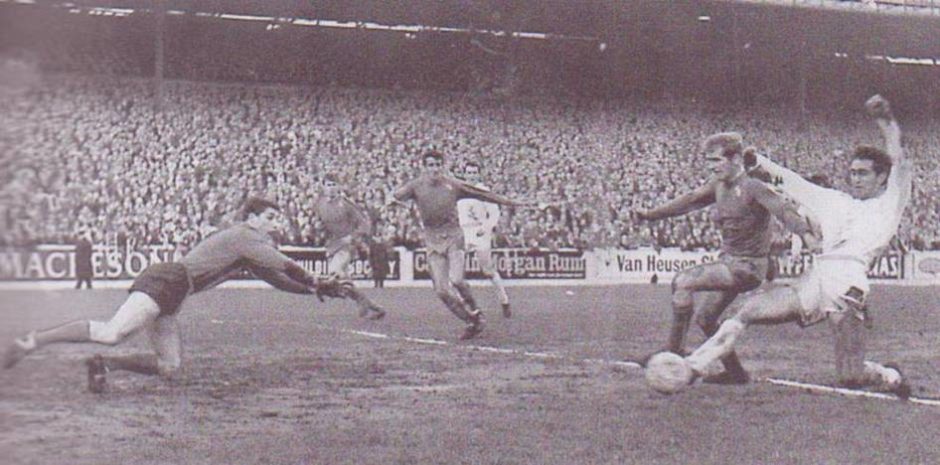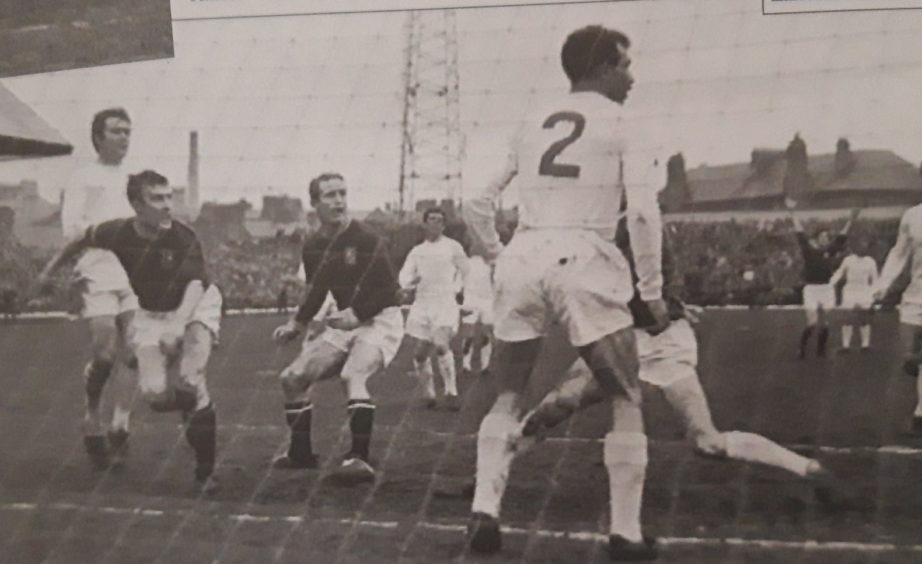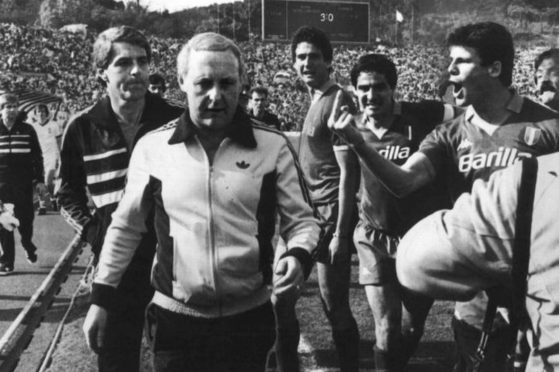
Hamish McAlpine is almost casual about the way he says it.
But 1984 really was the year Dundee United could have won the European Cup.
Two goals up against Roma from the first leg of the competition’s semis, the Tangerines were on course for what would have been a mouthwatering Final against Liverpool, themselves a goal up in their semi against Dinamo Bucharest.
“If that had happened, I think we could have beaten Liverpool, I really do,” said the keeper.
“They were very strong then, thanks in no small part to the Scottish lads – Alan Hansen, Kenny Dalglish, Steve Nicol, Gary Gillespie and Graeme Souness.
“But the fact was that, on our day, we could beat anybody, we really could.
“I would look at our team and there wasn’t a weakness.
“You had the likes of Maurice Malpas, Dave Narey, Paul Hegarty and Richard Gough at the back.
“Eamonn Bannon and Ralph Milne would get through an absolute power of work going forward and back on the wings, and then up front you had Luggy (Paul Sturrock) and Davie Dodds.
“Add in the other lads – Billy Kirkwood and Derek Stark, who scored a great long-range effort in the first leg of the semi – and it was a terrific side.
“Plus, thanks to Jim McLean, we were super-fit. We defended as a team, attacked as a team and we were relentless.”
United had beaten Hamrun Spartans of Malta, Belgium’s Standard Liege and Austrian champions Rapid Vienna to set up a sell-out for the Italians’ visit.
“Roma underestimated us at Tannadice,” McAlpine reflected.
“We were fitter, stronger and more skilful than they expected and we deserved that 2-0 lead.
“It wasn’t enough, however, so we will never know who would have come out on top had we played Liverpool in the Final.”
It has been alleged Roma bribed the referee Michel Vautrot ahead of the second leg in Rome.
Two years ago, club director Riccardo Viola insisted his club gave the Frenchman 100-million lira (around £50,000) but that has never been conclusively proved.
John Holt, who replaced Stark at half-time in Rome’s Olympic Stadium, has spoken about the dubious decisions made on a day when United fell short, and the Italians grabbed the required three goals to win through.
What really sticks in McAlpine’s mind was the abuse United took after the final whistle.
“Crazy is the word that comes to mind. It was like they wanted to kill us,” he said.
“And that was with them getting the result they needed!
“Jim McLean and Walter Smith got the worst of it on the pitch. Their players really seemed to target them, particularly the manager.
“We didn’t escape completely, though, because their fans waited behind and gave us a huge amount of abuse when we left to get on our bus.
“They pelted us with rotten fruit and battered the sides of the bus and screamed all manner of insults.
“It was not a very nice experience.
“Happily, overall the good memories outweigh the bad.
“We might not have won the European Cup, but we were champions of Scotland and no one can ever take that away from us.”
Celtic, European Cup, 1971-72
Celtic missed out on a third European Cup Final in heartbreaking fashion.
A miss by Dixie Deans in a penalty shoot-out let Inter Milan proceed to face Ajax in Rotterdam.
Deans had come on as a substitute for Kenny Dalglish at Parkhead.
Although making his first appearance in Europe for the Hoops, he was the sort of ruthless finisher who looked ideal for taking spot-kicks.
Despite not joining the club from Motherwell until October 31, he finished the campaign as Celtic’s top scorer with 27 goals.
Celtic eliminated BK Copenhagen from Denmark, Malta’s Sliema Wanderers and Ujpest Dosza of Hungary before facing Inter – the side they’d beaten to lift the European Cup five years previously.
Neither side could hit the net in 210 minutes of football, and the tie was to be settled by kicks from 12 yards in front of 75,000 supporters.
Deans stepped up to take the first penalty and sent his effort over the bar.
He would later say that he wasn’t nervous taking the kick, he was happy to be first and would love to do it all again.
The Italians converted all five kicks to make the Final, where they couldn’t get the better of Johan Cruyff , who scored both goals in a 2-0 win for Ajax.
Rangers, Fairs Cup, 1968-69
Rangers’ run to the brink of the Fairs Cup Final – wins against Vojvodina of Yugoslavia, Ireland’s Dundalk, DWS from Holland and Spain’s Athletic Bilbao – came to a climax on a night of shame at St James’ Park.
The second leg of the semi-final against Newcastle United was marred by a mass pitch invasion that took almost 20 minutes to resolve.
The Light Blues and Geordies had played out a goal-less first leg at Ibrox, with the hosts passing up numerous chances and Andy Penman having a penalty kick saved by Ian McFaul.
Goals from two Scots, former Partick Thistle midfielder Tommy Gibb and ex-Dunfermline winger Jackie Sinclair, ended the Ibrox side’s hopes of making another European final.
It was Sinclair’s strike in the 77th minute that prompted a pitch invasion.
Bottles and cans flew as fans from Scotland flooded out of the Gallowgate end to battle with police.
A police spokesman was quoted as saying: “If we’d had enough men, we’d have arrested the 2,000 fans who were on the park.”
Thirty arrests were made, 89 were injured and the reputation of Scottish supporters was severely bruised.
Newcastle’s Perth-born captain, Bobby Moncur, scored three times as the Magpies beat Ujpest Dozsa 6-2 on aggregate to win the trophy.
Hibs, European Cup, 1955-56
Hibs have a special place in the history of European football, but it might have been even more spectacular.
The Edinburgh side were the first British side to play in the European Cup, despite finishing fifth in Scotland’s First Division in 1955.
Aberdeen were league champions but turned down the chance to take part in the new competition.
They didn’t install floodlights until 1959, but Hibs had purchased lights – a pre-requisite for taking part – four years before that.
England’s title-winners, Chelsea, also declined on the advice of Football League secretary, Alan Hardaker.
So Eddie Turnbull was the first British player to score a competitive goal in Europe and inspired a 4-0 win away to Rot-Weiss Essen.
A 1-1 draw with the West Germans in the second leg saw them progress to play two legs in Scotland!
Djurgardens of Sweden were unable to host a home match because of severe weather, and the first game took place at Partick Thistle’s Firhill.
Hibs won 3-1 in Glasgow and 1-0 at Easter Road to set up a semi-final against Reims of France.
They boasted the brilliant Michel Hidalgo and Raymond Kopa, and won 2-0 at home and 1-0 away.
But they lost the first European Cup Final 4-3 to Real Madrid.
Celtic, Cup-Winners’ Cup, 1963-64
Celtic had an amazing run to the last four of the Cup-Winners’ Cup in only their second taste of Europe.
They had beaten Basel, Dinamo Zagreb and Slovan Bratislava but inexperience cost them dearly against MTK Budapest.
They went to Hungary with a 3-0 lead, thanks to two goals by Stevie Chalmers and one from Jimmy Johnstone, but the return was a painful lesson in how not to deal with a tricky second leg.
Only 10,000 turned up for the game, and Celtic continued to play an attacking game when holding on to their advantage should have been the top priority.
Jimmy McGrory’s side conceded an early goal and didn’t take the warning.
Johnstone and Hughes both hit the net but had their efforts rule out for offside.
In 47 minutes, Vasas scored from the penalty spot after Tommy Gemmell had punched a shot over the bar.
Two more goals completed Celtic’s semi-final nightmare.
The Hoops had been widely expected to reach the Final in Brussels against Sporting Lisbon on May 13.
But six of the side that blew it in Budapest were in the team that lifted the European Cup just three years later.
Kilmarnock, Fairs Cup, 1966-67
Kilmarnock’s run to the Fairs Cup semi-final is often seen as little more than a footnote to the amazing events that lit up Scottish football in 1967.
That’s not surprising.
Celtic became the first British team to win the European Cup, Rangers lost the Cup-Winners’ Cup Final against Bayern Munich and the national team beat England 3-2 at Wembley and declared themselves world champions.
Killie despatched Royal Antwerp, Gent and Lokomotiv Leipzig to reach the last four of the Fairs Cup.
Standing between them and Final against Dinamo Zagreb was Don Revie’s Leeds United.
The Ayrshire men were without the attacking talents of Tommy McLean and Jackie McInally for the first leg in Yorkshire.
Losing the game 4-2 gave them a mountain to climb when the teams clashed at Rugby Park.
Brian McIlroy’s two goals at Elland Road offered a glimmer of hope but it was a tough ask against a Leeds side adept at closing out a tie.
Some will call it cynical, others reckon it was professional.
Revie’s side played with just one up front and came away with a 0-0 draw.
Killie missed out on a European final but enhanced their reputation outside of Scotland.
Dundee, Fairs Cup, 1967-68
Leeds United denied a Scottish side the chance of a European final for the second successive season.
Clyde had originally secured a place with a third-place league finish, but rules allowed only one team from each city in the tournament and Glasgow’s representatives were Rangers.
The Yorkshiremen went to Dens Park for their third successive tie against a team from Scotland, having already knocked out Hibs and Rangers.
Dundee beat DWS of Holland, Belgians RFC Liege and Swiss outfit FC Zurich to reach the last four.
Don Revie’s men were without first-choice goalie Gary Sprake, with David Harvey – a future Scotland internationalist – deputising. And it was another stand-in – Paul Madeley replacing injured striker Mick Jones – who put Leeds ahead.
His goal came after Dundee keeper Ally Donaldson had brilliantly stopped a net-bound effort from Eddie Gray.
The Dark Blues levelled when Alex Kinninmonth’s header was cleared off the line and Bobby Wilson nodded in.
Elland Road’s Spion Kop had been demolished as part of Elland Road’s redevelopment and only 23, 380 fans watched the return.
Dundee dominated the early stages, but a goal from Eddie Gray sent Leeds through to the final in their 66th competitive game of the season.
Read part two in this weekend’s Sunday Post

Enjoy the convenience of having The Sunday Post delivered as a digital ePaper straight to your smartphone, tablet or computer.
Subscribe for only £5.49 a month and enjoy all the benefits of the printed paper as a digital replica.
Subscribe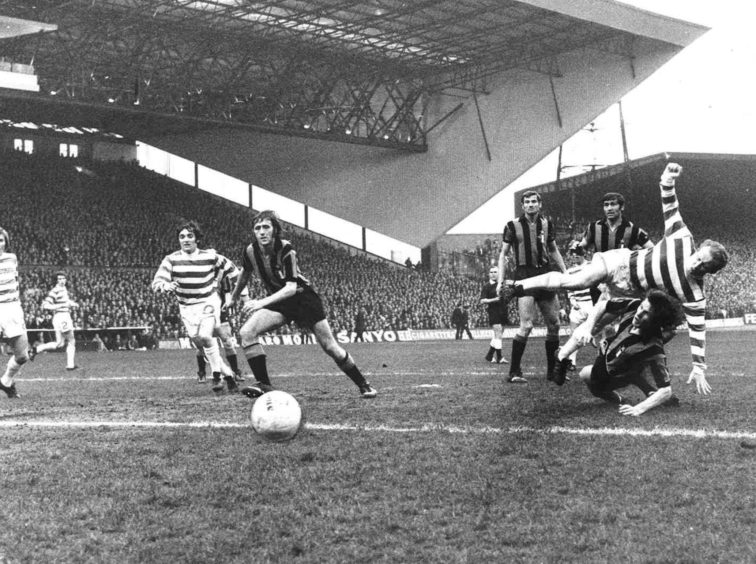
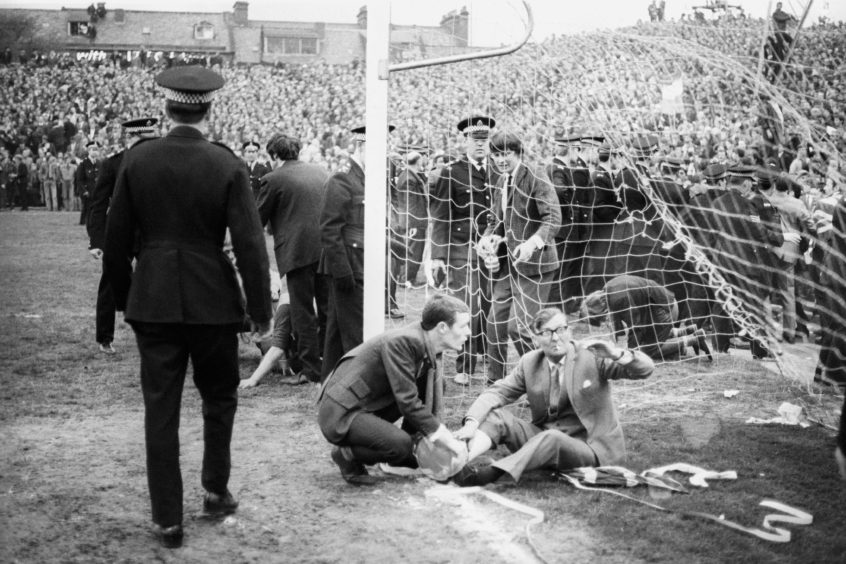 © PA
© PA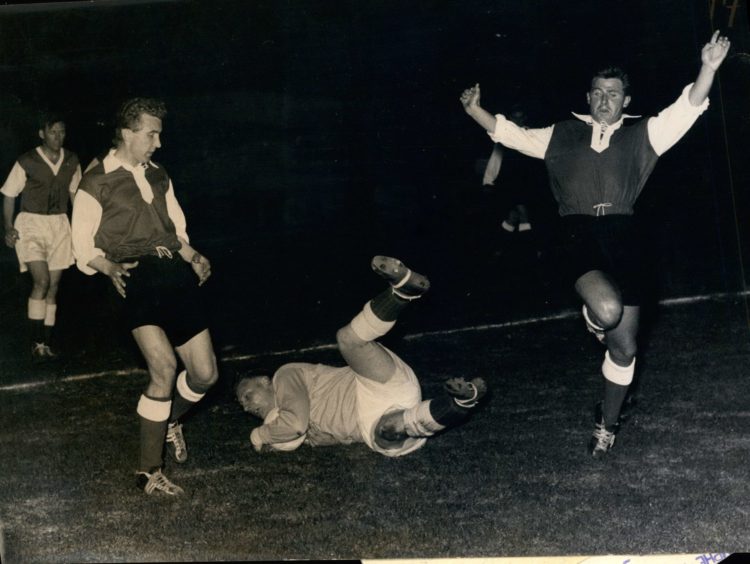 © Keystone Pictures USA/Shutterstock
© Keystone Pictures USA/Shutterstock 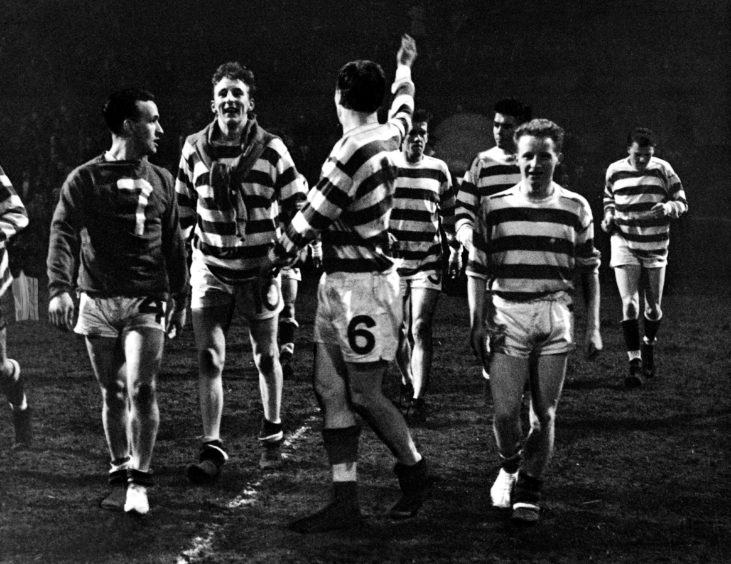 © PA
© PA